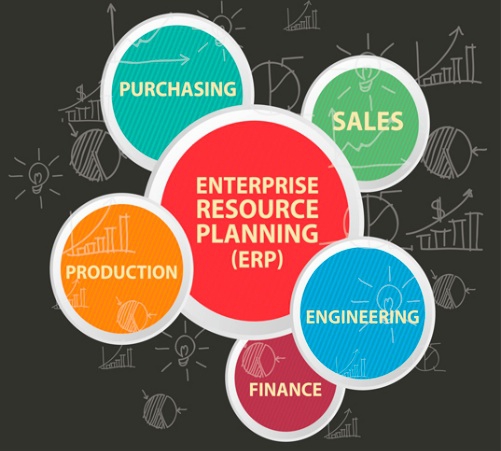
Software solutions: problems commonly solved by deploying ERP
May 21, 2015
By David Doyle

May 20, 2015 – Peter worked long, frustrating hours trying to keep production moving. He moved from crisis to crisis trying to hunt down materials that were supposed to be in inventory, changing the production schedule on the fly to adapt to the latest obstacle. Peter wasn’t bad at his job, he just didn’t have the information he needed to do his job properly.
Peter’s story is pretty typical for manufacturers who have outgrown spreadsheets and systems that don’t share information where a whole host of problems start to manifest: problems that are best solved by Enterprise Resource Planning (ERP) software.
ERP software helps manufacturers run their business smoothly and efficiently. It lets sales see what can be made and when. It helps production know how to best meet that demand. It lets purchasing know what to order. And finally it gives finance insight in to all of those activities so they can make sure the business has enough cash to keep running.
Here is how the various departments in a business can benefit from ERP:
Sales
The types of problems that your sales team experience when the company is ready for ERP are primarily related to time and administration. From a ballooning number of order takers who are prone to error to salespeople becoming frustrated with the effort related to forecasting, ERP systems can help sales by reducing the time spent on order entry, improving the accuracy of information, and increasing the time they spend selling.
Order taking can be sped up by pulling orders automatically from customers’ ERP systems or by generating the sales order from quotes. Similarly, estimating and quoting through an ERP system makes the whole process more repeatable and efficient — you can reuse more from past quotes and query data from past jobs.
The most important improvement comes in how an ERP system helps salespeople by automating forecasts using historical data and booked sales with little human oversight. This results in more accurate forecasts with less effort.
Purchasing
The increased predictability brought by automating sales forecasts and improving their accuracy unlocks a cascade of benefits throughout the operations department. If your purchasing department is struggling to keep the right materials in stock and you’re doing a lot of expediting, then you might need an ERP system.
Materials requirements planning combined with sales forecasting in an ERP system lets you automate purchasing. Your purchasing department can quickly make sure really important materials will be on hand when you need them. It also lets everyone in the company check how long it will take to deliver on an order with stock, materials, goods in transit, and lead times all in one system. As well, buyers will also have more time to spend on strategic activities such as sourcing, qualifying suppliers, and negotiations.
Production
The main problems that an ERP system can solve for your production team relates to planning and scheduling. If production is mainly reacting to the latest crisis, then they would benefit from the improved predictability and access to information that ERP systems provide.
Improved predictability from sales forecasting doesn’t just help purchasing. It also helps production create realistic plans that meet the demand of sales in the most efficient way — greatly reducing the number of work orders that need to be expedited. And operations will be able to identify bottlenecks before they happen and make alternate arrangements.
Similarly, because purchasing is now able to better source materials in time, production won’t have to suddenly drop plans because of shortages nearly as often.
By formalizing your estimating and quoting processes in ERP, you can then use your quotes to automatically generate the necessary job orders and other related documents. This is a huge time-saver because production no longer needs to re-enter the data that estimating quoted. It also ensures accuracy, as it makes sure production builds what was actually quoted.
Engineering
Engineers who spend too much time supporting the sales process could have much of that time freed up to spend on engineering with the right ERP system.
With highly-customizable products or in engineer-to-order production environments, engineers will always have some contact with sales. Transferring the engineer’s knowledge into a product configurator for customizable products lets engineers spend less time supporting sales, and sales can spend less time chasing engineers.
Finance
Finally, when your finance team is crushed under the weight of your month-end procedures, it might be worth considering an ERP system. Any decent ERP system will greatly reduce the time you spend on month-end and year-end procedures. The increased predictability of the business will also streamline purchasing and production resulting in lower costs while improving perfect order rate resulting in higher revenue.
There’s nothing wrong with running a business on non-integrated systems. As long as the workarounds stay manageable and inefficiencies aren’t too crippling, you are probably better off sticking with whatever disparate systems that you have in place. The cost in both dollars and time of an ERP means that smaller companies are better off running their businesses on Microsoft Excel, paper and whatever other standalone system each department prefers. But if you keep growing, your business will get too big and too complex to manage without one.
The improvements to your business that flow from better forecasting and sharing of information are only available in an integrated ERP system. And the challenges faced by companies that need a system reverberate throughout the company.
David Doyle (david.doyle@ca.syspro.com) is vice-president sales at Syspro Canada. He has 25 years of experience in the ERP software field.
This feature originally appeared in the May 2015 issue of Manufacturing AUTOMATION.